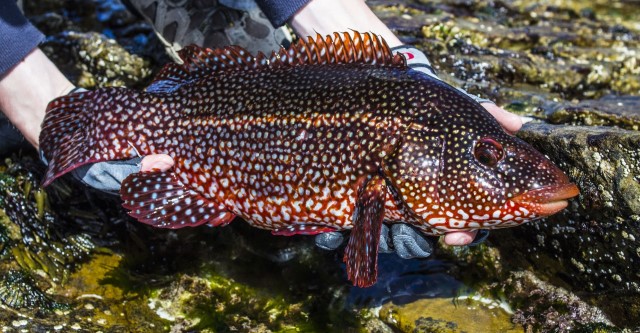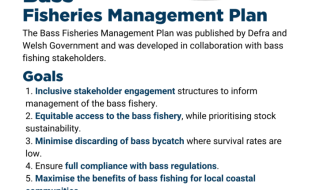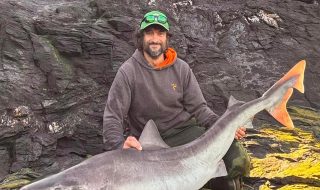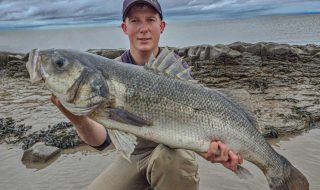The Angling Trust has launched a national campaign calling for an immediate closure of the live capture wrasse fishery supplying fish to the Scottish salmon farming industry and is urging all anglers and conservationists to get involved.
Live wrasse are now being transported from the South West of England to Scottish salmon farms where they are used as ‘cleaner’ fish, to eat the sea lice that infest caged salmon. Sea lice cause serious damage to both the farmed fish and to wild salmon and sea trout throughout the region.
The Angling Trust’s campaign to end the live wrasse fishery includes an online petition, an email system to lobby councillors and a poster to be displayed in fishing tackle shops.
The demand for wild-caught wrasse for this purpose has seen a boom in the value of wrasse, which was just a few years ago of little commercial value and only used as pot bait for crabs and lobsters. The live capture fishery now means wrasse is one of the most valuable species landed into UK ports – fetching up to £150 per kilo – and the opportunity to profit from this has seen uncontrolled expansion of the fishery.
However, very little is known about the status of the stocks of wrasse species being targeted or about the impact of removing these fish from the ecosystem. In addition, wrasse are an important and highly valued species for members of the public who go fishing along the coast of the South West of England, spending many millions of pounds supporting local businesses. They are especially popular with young and beginner sea anglers learning how to fish as they can be caught close to the shore on simple methods. Concerns have also been raised about the well-being of fish being transported the length of the UK, where they spend just one year in the cages before being killed when they get too large.
The Angling Trust is calling for an immediate closure of the live wrasse fishery on the basis of the precautionary principle until fishery managers have sufficient evidence to quantify the impact it is having on wild wrasse populations and whether it is in accordance with requirements under the Marine and Coastal Access Act to manage sea fishery resources.
Several of the regional Inshore Fisheries and Conservation Authorities (IFCAs) have already started managing the commercial wrasse fisheries in their respective districts with a variety of measures, predominantly on a voluntary basis. However, the Angling Trust doesn’t feel that these measures are sufficient given the absence of wrasse stock data and the uncertain impacts that large-scale removal of wrasse might have on the coastal ecosystem and on recreational sea angling. Fish Legal has written to Defra to express its concern at the absence of coordinated action to regulate wrasse exploitation.
Anglers can help support the campaign by signing the petition to the five regional IFCAs that have the power to close down the live wrasse fisheries in each of their respective districts – Cornwall IFCA, Devon & Severn IFCA, Southern IFCA, Sussex IFCA and Isles of Scilly IFCA. The Angling Trust also wants anglers and members of the public who fish in the South and West to lobby the councillors – who sit on the IFCA committees and can influence policy – by writing to them.
Well-respected wrasse angler Danny Parkins said: “Wrasse are such an important species to the environment and anglers alike. They are the keepers of the reefs and gulleys and as such are a key part of the ecosystem. Being a resident species – which tend to stay in and around their family groups – by taking these amazing fish you not only lose a fantastic and beautiful sport fish which brings joy to hundreds of anglers, you are also damaging and removing a fish that plays a vital role in the marine environment.
Recreational sea anglers like me catch and release wrasse whereas those taken for cleaner fish will be killed when they get too big for the salmon farms. Please support the Angling Trust’s efforts to protect these stunning fish.”
Steven Neely, Owner of Fish On Lures and regular writer in Total Sea Fishing Magazine, concluded: “The wrasse is often deemed a humble fish by many but for the lure angler it offers some of the best rod bending sport around our coastlines. After all, is there any better sight than a brightly coloured wrasse surfacing from among the boulders or kelp on a summer’s day?
I understand why there might be need for a more environmentally friendly alternative to the pesticides used in salmon farming; however, devastating the stocks of this stunning species is not the solution. As a lure angler and conservationist I will be behind this campaign 100% and let’s hope we can act before the damage is irreversible.”
Mark Lloyd, Chief Executive of the Angling Trust & Fish Legal said: “The salmon farming industry has already destroyed numerous wild salmon and sea trout fisheries on the West Coast of Scotland and now seems intent on doing the same to wild wrasse stocks in the South West of England. The only safe way to farm salmon is in sealed units with recirculation systems, which are now being required for all new farms in Norway.”
James Champkin, Campaigns Officer for the Angling Trust, said: “We’ve made it easy for anglers and conservationists to get involved in the new “Help Save Our Wrasse” campaign: there’s an online petition to sign and email links to local councillors on our new campaign webpage. People can click on a link depending on which IFCA district they fish in to pull up an email addressed directly to the relevant councillors. We’ve also provided some key information to include in emails (which can be downloaded from the campaign webpage), although it’s best to make it as personal as possible. We hope thousands of people will tell the councillors why wrasse are important to them and why the IFCAs should close the fishery down immediately.”






